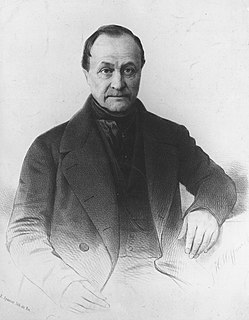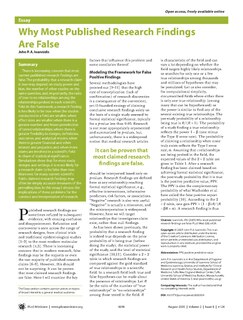
Social science is one of the branches of science, devoted to the study of societies and the relationships among individuals within those societies. The term was formerly used to refer to the field of sociology, the original "science of society", established in the 19th century. In addition to sociology, it now encompasses a wide array of academic disciplines, including anthropology, archaeology, economics, human geography, linguistics, management science, communication science, political science and psychology.

Isidore Marie Auguste François Xavier Comte was a French philosopher and writer who formulated the doctrine of positivism. He is often regarded as the first philosopher of science in the modern sense of the term. Comte's ideas were also fundamental to the development of sociology; indeed, he invented the term and treated that discipline as the crowning achievement of the sciences.
Scientific consensus is the generally held judgment, position, and opinion of the majority of scientists in a particular field of study at any particular time.
The philosophy of social science is the study of the logic, methods, and foundations of social sciences. Philosophers of social science are concerned with the differences and similarities between the social and the natural sciences, causal relationships between social phenomena, the possible existence of social laws, and the ontological significance of structure and agency.
"Publish or perish" is an aphorism describing the pressure to publish academic work in order to succeed in an academic career. Such institutional pressure is generally strongest at research universities. Some researchers have identified the publish or perish environment as a contributing factor to the replication crisis.

Positivism is an empiricist philosophical theory that holds that all genuine knowledge is either true by definition or positive—meaning a posteriori facts derived by reason and logic from sensory experience. Other ways of knowing, such as theology, metaphysics, intuition, or introspection are rejected or considered meaningless.
Citation impact is a measure of how many times an academic journal article or book or author is cited by other articles, books or authors. Citation counts are interpreted as measures of the impact or influence of academic work and have given rise to the field of bibliometrics or scientometrics, specializing in the study of patterns of academic impact through citation analysis. The journal impact factor, the two-year average ratio of citations to articles published, is a measure of the importance of journals. It is used by academic institutions in decisions about academic tenure, promotion and hiring, and hence also used by authors in deciding which journal to publish in. Citation-like measures are also used in other fields that do ranking, such as Google's PageRank algorithm, software metrics, college and university rankings, and business performance indicators.
A metatheory or meta-theory is a theory whose subject matter is theory itself, aiming to describe existing theory in a systematic way. In mathematics and mathematical logic, a metatheory is a mathematical theory about another mathematical theory. Meta-theoretical investigations are part of the philosophy of science. A metatheory is not applied directly to practice, but may have applications to the practice of the field it studies. The emerging field of metascience seeks to use scientific knowledge to improve the practice of science itself.
The history of the social sciences has origin in the common stock of Western philosophy and shares various precursors, but began most intentionally in the early 19th century with the positivist philosophy of science. Since the mid-20th century, the term "social science" has come to refer more generally, not just to sociology, but to all those disciplines which analyze society and culture; from anthropology to linguistics to media studies.
The law of three stages is an idea developed by Auguste Comte in his work The Course in Positive Philosophy. It states that society as a whole, and each particular science, develops through three mentally conceived stages: (1) the theological stage, (2) the metaphysical stage, and (3) the positive stage.

PLOS One is a peer-reviewed open access scientific journal published by the Public Library of Science (PLOS) since 2006. The journal covers primary research from any discipline within science and medicine. The Public Library of Science began in 2000 with an online petition initiative by Nobel Prize winner Harold Varmus, formerly director of the National Institutes of Health and at that time director of Memorial Sloan–Kettering Cancer Center; Patrick O. Brown, a biochemist at Stanford University; and Michael Eisen, a computational biologist at the University of California, Berkeley, and the Lawrence Berkeley National Laboratory.

The psychology of science is a branch of the studies of social science defined most simply as the study of scientific thought or behavior. It is a collection of studies of various topics. The thought of psychology has been around since the late 19th century. Research on the psychology of science began in 1874, the field has seen a substantial expansion of activity in recent years. The specific field of psychology as a science first gained popularity mostly in the 1960s, with Abraham Maslow publishing an influential text on the subject, but this popularity faded, only re-emerging in the 1980s. Other studies of science include philosophy of science, history of science, and sociology of science or sociology of scientific knowledge.

The branches of science, also referred to as sciences, scientific fields or scientific disciplines, are commonly divided into three major groups:
Hard science and soft science are colloquial terms used to compare scientific fields on the basis of perceived methodological rigor, exactitude, and objectivity. Roughly speaking, the formal sciences & natural sciences are considered "hard", whereas the social sciences are usually described as "soft".

Sociology is a social science that focuses on society, human social behavior, patterns of social relationships, social interaction, and aspects of culture associated with everyday life. It uses various methods of empirical investigation and critical analysis to develop a body of knowledge about social order and social change. While some sociologists conduct research that may be applied directly to social policy and welfare, others focus primarily on refining the theoretical understanding of social processes and phenomenological method. Subject matter can range from micro-level analyses of society to macro-level analyses.
Computational social science is the academic sub-discipline concerned with computational approaches to the social sciences. This means that computers are used to model, simulate, and analyze social phenomena. While large scale computational methods have been applied to natural sciences for decades, interest in applying data science to social sciences has grown significantly in the last decade. Fields include computational economics, computational sociology, cliodynamics, culturomics, and the automated analysis of contents, in social and traditional media. It focuses on investigating social and behavioral relationships and interactions through social simulation, modeling, network analysis, and media analysis.

The replication crisis is an ongoing methodological crisis in which it has been found that the results of many scientific studies are difficult or impossible to reproduce. Because the reproducibility of empirical results is an essential part of the scientific method, such failures undermine the credibility of theories building on them and potentially call into question substantial parts of scientific knowledge.
The gateway belief model (GBM) is a dual process theory in psychology and the communication sciences. The model suggests that public perception of the degree of normative (expert) agreement – or (scientific) consensus – on societal issues, such as climate change, vaccines, evolution, gun control, and GMO's functions as a so-called "gateway" cognition, influencing an individual's personal opinions, judgments, attitudes, and affective dispositions toward various social and scientific issues.
Metascience is the use of scientific methodology to study science itself. Metascience seeks to increase the quality of scientific research while reducing inefficiency. It is also known as "research on research" and "the science of science", as it uses research methods to study how research is done and find where improvements can be made. Metascience concerns itself with all fields of research and has been described as "a bird's eye view of science". In the words of John Ioannidis, "Science is the best thing that has happened to human beings ... but we can do it better."

Sander L. van der Linden is a social psychologist and professor of social psychology in society in the department of psychology at the University of Cambridge, England where he has directed the Cambridge Social Decision-Making Laboratory since 2016. He is also a fellow and director of studies in psychological and behavioural sciences at Churchill College, Cambridge, a research affiliate of the Yale Program on Climate Change Communication at Yale University and the Winton Centre for Risk and Evidence Communication at the University of Cambridge.







